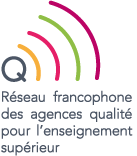In 2014, the CTI set up steering committees made up of members of the Commission and the permanent team, special advisers, experts, engineering students, stakeholder representatives. These steering committees met at least three times a year, sometimes more. Their purpose was to discuss substantive and/or thematic issues and to propose strategic guidelines to the CTI Board. In 2019, some of these steering committees have been transformed into working groups, which meet according to the needed timelines and whose objectives remain the same as those of the former steering committees.
Working Group on Quality Assurance
The main purpose of this working group is to discuss the CTI’s continuous improvement and its internal and external quality systems. It is improving the CTI’s documentary organisation and is drawing up its quality manual, which will be published shortly.
Programming Committee
The main purpose of the Programming Committee is to prepare the future audit campaigns and to set up the expert teams. It supports the improvement of the way evaluation processes are carried out and the development of tools for the expert panel. It reflects on best practices and remedies for any observed malfunctions. The Committee coordinator is a member of the CTI Board, to which he reports monthly on the Committee’s work and proposals. A member of the permanent team plays a very active role in the Committee’s work.
Working Group on Standards and Criteria
The main task of this working group is to initiate and coordinate the annual updating of the Standards and Criteria for the engineering degree programmes (R&O) and the bachelor’s programmes (BSE).
Throughout the year, the role of this working group is to clarify the description of the Standards & Criteria in order to initiate changes and to update the expected outcomes.
International relations referents
An informal working group has been set up by the CTI’s international relations referents. These are members, special advisers and permanent staff of the CTI who represent the CTI in various organisations and events and are specialists either in a geographical region or in a particular topic. The CTI has referents for Canada and Quebec, the Maghreb, sub–Saharan Africa, the ENAEE association and the EUR–ACE label, the ECA, ENQA, FrAQ–Sup associations, the EQAR register, etc.
The role of the referents is to monitor quality assurance and higher education in Europe and beyond. They inform and consult with the CTI governance. They contribute to the implementation of the CTI’s international strategy and initiate or monitor repercussions on the CTI’s procedures and standards.
Budget Committee
The Budget Committee is responsible for preparing decisions relating to the CTI’s budget for discussion at the Board meetings and approval at the plenary sessions. This Committee draws up budget forecasts for several years and updates the current budget.
This Committee also advises the Board on monitoring the implementation of the management agreement with the CTI’s administrative operator (CDEFI) and on any issue with significant political or budgetary implications.
Thematic Working Groups
Other working groups are set up according to current events and the perceived need for change. Some of the issues on which the CTI is currently working are: work-study tracks; Social & Environmental Responsibility (RSE); the quality certification label Qualiopi; certified data by HEIs; CTI-Hcéres cooperation (coordination of evaluation procedures, international relations, exchanges of good practice…), etc.
The Strategic Orientation Committee
The CTI can rely on a consultative Strategic Orientation Committee (“COS”) for any strategic reflection and analysis concerning its role, missions, quality approach and major criteria.
Set up for a limited period, this council is made up of:
* representatives of national or international CTI stakeholder institutions,
* qualified individuals recognised for their expertise in the educational, scientific, technological, quality assurance, international, economic or industrial fields.
The COS meets on the initiative of the CTI President or by a vote of the plenary session.

